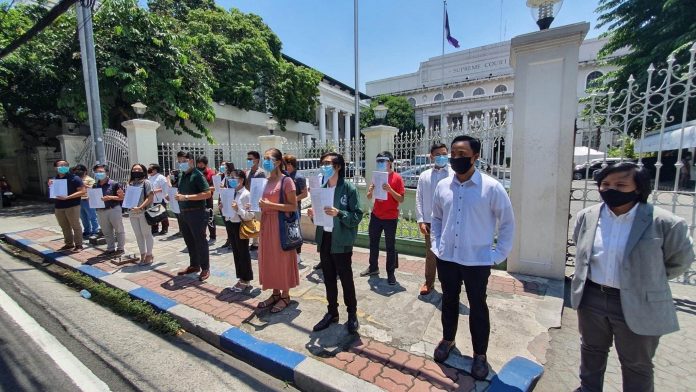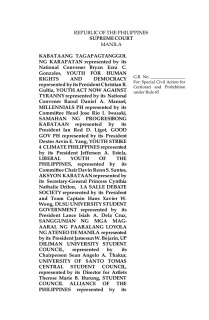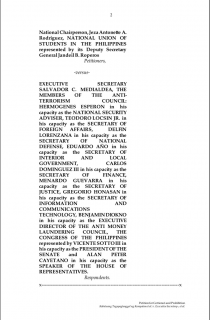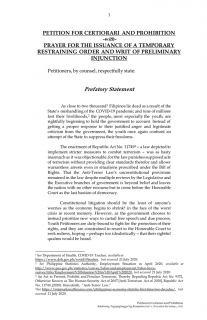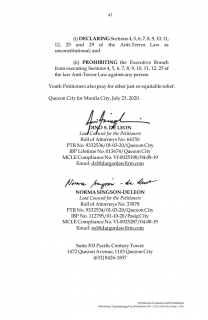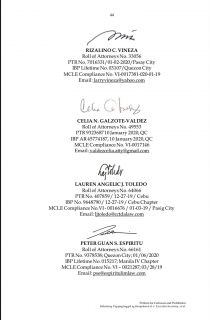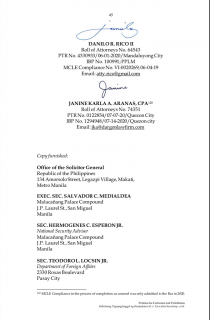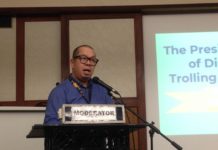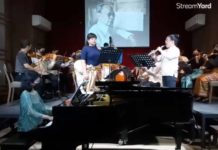Officers of the UST Central Student Council (CSC) along with 15 other student leaders from top universities and youth organizations filed the 15th petition to declare provisions of the Anti-Terrorism Law of 2020 unconstitutional at the Supreme Court on Thursday, July 23.
CSC President Robert Dominic Gonzales and Artlets Student Council Director for Campaigns and Advocacies Therese Marie Ifurung joined other youth leaders in the 47-page petition.
The petitioners urged the high tribunal to void 11 sections of the law and issue a temporary restraining order and a writ of preliminary injunction.
“This petition proves that we stand true to our words—that we, Thomasians, are one with the Filipino people in calling for the junking of Terror Law,” Ifurung told the Varsitarian in an online interview.
Ifurung said the Anti-Terror Law disregards human rights and could treat critics as terrorists.
“Kung gaano kahigpit ang administrasyong Duterte, gano’n din ang laban ng kabataan… We must not let mere criticism and dissent be defined as acts of terrorism, because these are essential in upholding democracy in our nation,” she said.
The University in June issued a statement opposing the terror law and urged the government to focus on the Covid-19 crisis.
“The proposed law which gives immense power to a special body shall have overreaching implications… The University appeals to the government to instead draw its efforts to fight the war against Covid-19,” UST said in its the June 8 statement.
‘Suppression of potential dissent’
The petition questioned the constitutionality of several provisions of the law that it said would suppress free speech and speech-related conduct, and curtailed the right to due process and “dress government abuses with a cloak of legality.”
The petitioners also said the law would have a “chilling effect” on free speech because of the vague definition of acts of terrorism.
Citizens, they argued, would be left to second-guess “whether their expressions are constitutionally protected forms of responsible civic participation or are already acts of terrorism within the meaning of the Anti-terror Law,” the petition said.
“No one can and should blame the Filipino People for their tendency to express their discontent as they see more and more of their countrymen die or lose their livelihoods,” the petition said, citing public sentiment over the coronavirus pandemic.
Although Section 4 of the law mentions protections for persons carrying out protests and advocacies, the petitioners said these were “worthless, empty, and meaningless,” since the Anti-Terrorism Council, all appointees of the president, were given wide discretion to order the detention of suspected terrorists.
The council is composed of the executive secretary, national security adviser, secretary of foreign affairs, secretary of national defense, secretary of the interior and local government, secretary of finance, secretary of justice, secretary of information and communication technology and the executive director of the Anti-Money Laundering Council Secretariat.
‘Right to due process’
In the highly debated Section 29 of the law, the Anti-Terrorism Council (ATC) is authorized to order warrantless arrests and detention for up to 14 calendar days, which can be extended for 10 days.
According to the petition, the law’s provisions on warrantless arrests and the council’s power to “designate” individuals and groups as terrorists contravened the constitutional right to due process and could depend on “whim and caprice.”
Section 25 of the law gives the power of designation to the council, to penalize an individual, groups of persons, organization, or association, domestic or foreign, upon probable cause of commission of terrorism.
The petitioners argued that the council was not the place for judicial determination in designating individuals or organizations as terrorists.
“In essence, the ATC supplants the need for a judicial determination of probable cause prior to restraining the most fundamental of civil liberties. In other words, the Anti-Terror Law confers the ATC with powers of a judge and jury in their own right, when in fact, none of its members are qualified to act as neither,” the petition stated.
‘Violation of separation of powers, checks and balances’
The youth petitioners also cited the law’s violation of the principle of checks and balances between the three branches of government, since the ATC is given the authority to conduct arrests. By law, only courts can issue arrest warrants.
“The Honorable Court has defined a warrant for crimes as a ‘judicial power,’ which is to say that the judiciary is vested with the exclusive power to order the temporary detention or confinement of a person,” the petition stated.
Since the ATC are all members of the Executive branch, the petition pointed out that “they are, by no stretch of the imagination, judicial officers authorized to perform judicial functions.”
Only the judge who is a “neutral and detached actor” has the authority to issue a warrant as stated by the Constitution, they said.
“To grant the power to issue ‘authorizations’ for arrest is to give them an incident of judicial power, the totality of which was vested by our Constitution in one Supreme Court and in such lower courts as may be established by law,” the petition said.
Youth petitioners
The petitioners, all youth-led organizations, emphasized that they have the right to question the constitutionality of the terror law, since they would “inherit this country.”
“Youth Petitioners possess clear and unmistakable rights that ought to be protected as this Petition invokes no less than the constitutional rights of freedom of speech and due process guaranteed to Youth Petitioners and the members of their respective organizations as citizens of the Republic of the Philippines,” the petition stated.
The constitution encourages the youth to be active in social and civic issues.
“The State recognizes the vital role of the youth in nation building and shall promote and protect their physical, moral, spiritual, intellectual, and social well-being. It shall inculcate in the youth patriotism and nationalism, and encourage their involvement in public and civic affairs,” Section 13, Article 2 of the 1987 Constitution states.
The petitioners feared that in filing the petition, they might be at risk of being arrested, since the law is already in effect.
“The implementation of the Anti-Terror Law exposes Youth Petitioners to the possibility of getting arrested without a warrant and thereafter suffering detention even in situations where the Constitution prohibits the same,” the petition claimed.
The CSC officers were joined by De La Salle University Student Government, Sanggunian ng mga Mag-aaral ng Paaralang Loyola ng Ateneo de Manila, University of the Philippines-Diliman University Student Council and the Student Council Alliance of the Philippines as co-petitioners.
Petitioners also included youth organizations, Kabataang Tagapagtanggol ng Karapatan, Youth for Human Rights and Democracy, Youth Act Now Against Tyranny, Millennials PH, Samahan ng Progresibong Kabataan, Good Gov PH, Youth Strike 4 Climate Philippines, Liberal Youth of the Philippines, Aksyon Kabataan, La Salle Debate Society and the National Union of Students in the Philippines.
The youth coalition is represented by Dino De Leon and Norma Singson-De Leon of De Leon Arevalo Gonzales Law Offices.
The youth-led petition was filed along with four others lodged by the National Union of Journalists of the Philippines, lawmakers, and framers of the 1987 Constitution, represented by the Free Legal Assistance Group. Bangsamoro residents also joined the petitioners and were represented by Algamar Latiph.
Eighteen petitions have been filed against the Anti-Terror Law.


